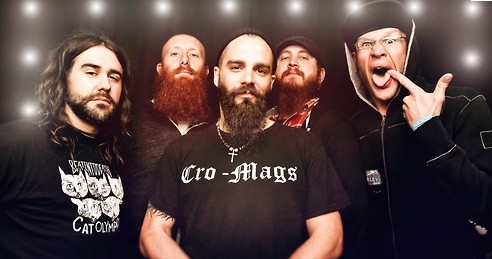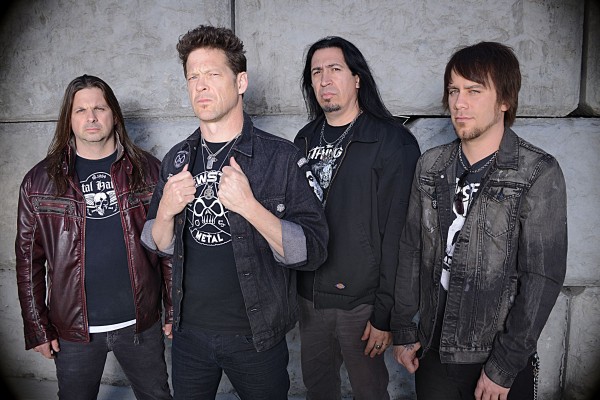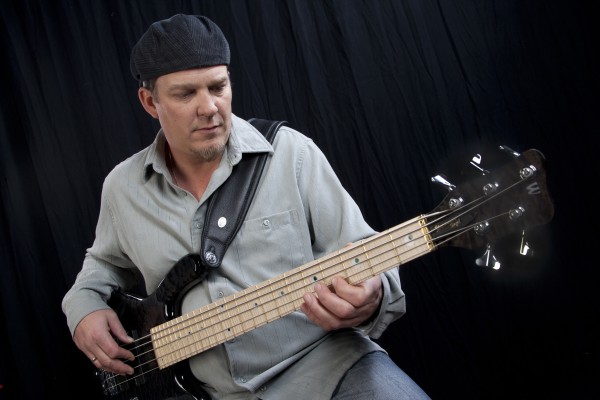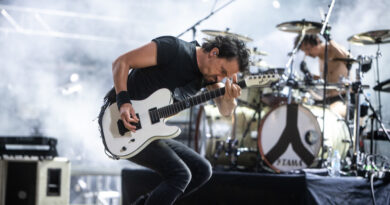Mike D’Antonio (KILLSWITCH ENGAGE) in interview
Short before the scheduled premiere of “Disarm the Descent” – long-awaited new studio album by reformed metalcore giant Killswitch Engage – we are talking to the band’s bass player to discuss the new record, his latest Death Ray Vision project, favorite bass equipment and personal career!
With Killswitch Engage you always played heavy and intense music, but your latest record seems even more brutal and heavy in than the previous ones in every aspect: the vocals, guitar sounds, blast beats… How can you relate to that?
Mike D’Antonio: Well, I appreciate your opinion. I guess that’s what we’ve been reaching for. After reflecting on what was going on with the band for the last couple of years I was just upset. Being on stage is like a kind of drug – if you don’t have it, you get into depression and withdrawals. I was amazed that we weren’t on tour for years and we were kind of wasting time away. It just encouraged me to write crazy stuff, being some of the most pissed off music I’ve written in a long time. Which is cool to get back to my roots that were very influenced by the old New York hardcore, heavy metal and stuff like that. For me it was refreshing. Once we all got together again, we started bringing our demos and listening to them. I believe I was the first one to start putting down demos [for the new album] and they were so aggressive. I think it pushed everyone to saying “wow! OK, we can go this way, let’s try it”. So I think that in a way I persuaded people to get a little crazier with the riffs, blast beats and stuff. In another aspect, I’m not sure if there are too many radio stations that are going to play those songs because they are so aggressive. But you know, some of our fans could say “huh, they’re going for that sugary radio single” and we don’t want and do not need a sugary single at this point.
All in all you retained the spirit of Killswitch Engage by adding a lot of melodic parts and harmonies every here and there.
Mike D’Antonio: Awesome, thank you!
So, all of you bring their ideas while preparing new material, although it is you who is the most responsible for the music this time…
Mike D’Antonio: You know, everyone brings something. Jesse was the last piece of the puzzle. Justin, Joel, Adam and myself were putting demos and listened to them to decide what sounded good. Then we would take that and go upstairs to Adam’s Pro Tools room, where we would make drums and lay down guitar tracks, the bass etc. That’s how we drew the initial outline of music by sitting around and playing instruments together. And then Jesse just got on top of it to do his thing.
You mean that vocal parts and lyrics did not determine the shape of the compositions?
Mike D’Antonio: It was all ready when Jesse came in with his vocals and fit in perfectly. It was like a last minute thing. I think that with the next album we’re going to take some more time writing and composing with him, but this time it worked out pretty well.
You’re having a lot of fun with Death Ray Vision lately. Did you start the band for your own fun or because there are certain things you want to play that you couldn’t do it in Killswitch Engage?
Mike D’Antonio: I think it’s a little bit of everything. As I kept on writing during Killswitch Engage hiatus there were five songs that didn’t fit with Killswitch. They were really punk rock and aggressive, more oldschool to what I used to play in the band Overcast when I was a kid. I called up Brian [Fair] to see if he was interested in playing this stuff. He loved it, so the band got together really quickly. We started to work on this material with Pete Cortese and Brian Fair from my old band Overcast. It was pretty easy to sit around and just bang some stuff, because everyone had a lot of ideas coming up in that oldschool vein. But Killswitch is definitely the main concern in my life and Death Ray Vision is just fun, something really cool to play and have a good time with your old local friends.
How is your cooperation with Bullet Tooth label – are you being pushed for deadlines or is it just up to you when Death Ray Vision record will come out?
Mike D’Antonio: It’s pretty wide open. Bullet Tooth is busy releasing a lot of stuff, so I’m not sure if it’s going to come out before or after the Killswitch album. I know it’s going to be somewhere around it. We had an EP that we put out ourselves and Josh from Bullet Tooth licensed that too. So that’s going to come out first. It will be available on vinyl which will be really cool to have that thing out. From there on we’re going to announce the record coming. The record’s done, we just need to master it. All the artwork is finished, I closed it just yesterday, in fact. So it’s all good to go and we just need to decide on when it will be appropriate to put that out. As Shadows Fall are on tour and Killswitch Engage are on tour as well, it will be a struggle for us to get together and play. Josh from Bullet Tooth wants us to have the record really show, and with all the craziness going on, who knows when that can be.
Let’s talk gear. Why did you stick to Ibanez? Did you try a lot of basses before choosing the ones you play right now?
Mike D’Antonio: I was a Gibson guy for a long time. I love my Thunderbird, that was my favorite bass ever. But the necks on those things are really easy to break, they’re very fragile. I had broken it on tour twice: the first time I nearly cried and the second time I told myself I would never bring it on tour again. It was just too heartbreaking for me to see my bass’s neck broken. I was then on tour with Shadows Fall and Paul [Romanko] said “why don’t you try my bass? Those new Ibanez basses are a lot better than they used to be”. So I picked up his bass and I really liked it. I went shopping with Adam and Joel, we pointed out five or six different basses that really fit my style and felt very comfortable. The Ibanez just made it the best for me, the neck was right – I got small fingers, so I need a really thin neck that’s easy to play. Since then I just stuck with Ibanez. They’re a really cool company, everyone there is super nice, they treat their artists amazingly well and give you everything you could hope for with a sponsorship. They put out my signature series bass, so that’s one of the coolest things you can have in this industry.
You used a few different Ibanez models. Which one is your favorite?
Mike D’Antonio: I was using the SRX700 for the longest time. I really liked the neck – it was a thru neck – and I loved the pickups. It was just a really solid sounding bass and I used those for many, many years. My new MDB signature now is based on the Destroyer shape and it’s a lot different than SRX700, more like a Gibson Explorer when it comes to the body type.
Yeah it’s a pretty straightforward design, but it’s got one interesting feature being the tone control placed on the back side of the body – what’s the concept behind this?
Mike D’Antonio: I’m a really sloppy player, I like to throw my bass around a lot and I would just hit on those knobs all the time. I wanted some sort of a toggle switch or a pot that you could push into the body and then get it out just to turn it, but they didn’t come up with anything that worked very well, especially with the amount of sweat I give out when I play. So now there is a cavity control on the back of the body that works really well, because I can tape over the whole and nothing is getting inside during the show. It’s working pretty awesome because it’s good not to have all those different features you can bump to on the body. That’s really cool. And I like that bass mainly because it still reminds me of that Thunderbird feel.
Did you use your signature bass to record Death Ray Vision’s “Not For Glory”? It seems perfect for that kind of music!
Mike D’Antonio: No, for the first EP I used the SRX700, but on the new LP I used the MDB signature model. It’s got that mid-range drilling sound, very attacky. But the one interesting thing that I’ve added to my gear setup is a Tronographic Rusty Box pedal which I started using on that first Death Ray Vision EP. It’s a preamp pedal that acts like a compressor/overdrive pedal. It really brightens things up but with that attack and low end that may get a little messed up if you’re just using an overdrive pedal. Now I’m using Seymour Duncan pickups and the seem to work really well with that.
Tell us about your signal path. What is your philosophy of a good bass sound?
Mike D’Antonio: I try not to step on the guitars [frequency range] too much. Thick low end, a bit of treble just to cut through. This Rusty Box I told you about fixes all my sound on stage. There are times when you can get too bassy and you can’t hear where you’re at as far as locking with the drums, and this thing just breaks everything out of that murk that sometimes Ampeg cabs can have.
Let’s go back a couple of years. Please tell us how you started to play bass. Was it your primary choice or did you originally want to play some other instrument?
Mike D’Antonio: I had two friends out of which one was playing bass, one was playing guitar. I tried both those instruments and I liked the guitar better, but I could afford a bass and I couldn’t afford the guitar – I think it was a 50 dollars difference. So I bought the bass and I got tablature sheets with all those old punk rock tunes that I started to learn how to play. I’m all self-taught in that way, and the strange part is that now as I grow older and look at my style, I play like a rhythm guitarist on a bass. [laughs] Maybe I’m just wishing I was the guitarist, I don’t know, but that’s really my style that’s made itself known.
Who inspired you the most in your early years as a bass player?
Mike D’Antonio: I loved the Cro-Mags while growing up, Harley Flanagan being one of the naughtiest, hi-performance bassists I’ve ever seen, throwing his bass around, going nuts and just really punishing the crowd by basically shoveling the bass down peoples necks. I think that more than anybody he inspired me to jump around and get crazy on stage, and put a lot of energy through the music we play. He had a huge influence on me and of course Steve Harris of Iron Maiden.
What was the breakthrough moment for you on your way to become a professional player?
Mike D’Antonio: I guess until we got signed to Roadrunner, I didn’t even think that I would ever be playing bass for a living, although I knew I’d be in bands for the rest of my life. I’m a graphic artist by nature, that’s what I went to school for and that’s what I’ll do after this band is done, but it’s really cool to do something that you never thought was possible. Every time I play with Adam, Joel and Justin I’m learning so much from them – it’s an invaluable experience that helped me get to the level I am now.
You said you’re a graphic artist. Can we see your work somewhere around the internet?
Mike D’Antonio: Sure. I’ve done all the Killswitch stuff as far as the tour merch, T-shirts, I’ve done arts for Shadows Fall and a lot of different bands and festivals around the world. If you visit www.darkicondesign.com, that’s where the main hub of my artwork is, so you might like to check that out.
When and why did you become a vegetarian? And does it in any way affect your approach to music?
Mike D’Antonio: It doesn’t affect anything really in my life. If there’s people sitting next to me eating meat, it doesn’t really bother me, I’m not an activist at all. It’s just my own business what I want to put in my body or what I don’t want to put in my body. I don’t care how people like to destroy their bodies – I destroy my body in other ways… Back in 1991 I was living in Boston, and you know it’s pretty expensive when you’re living on your own, working your way to college. So I went to the Krishna temple that did free vegetarian meals every Sunday to get something to eat. One day I went there and I met a guy who told me all about vegetarianism. I thought it was a pile of junk until he said that one thing that struck me very hard and I couldn’t stop thinking about it. That thing was: does something have to die because I want a snack? It seems like an extremely selfish way to think about life. I decided not to live like that.
Thank you for your time and good luck with all your bands!
Mike D’Antonio: Great, thank you very much!
Interview: Mikolaj Sluzewski




